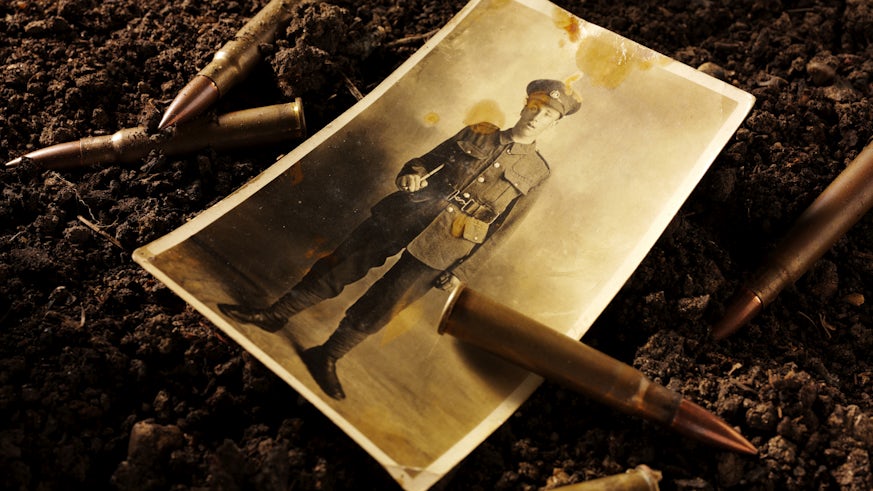Doves and Hawks
5 January 2015

As part of the World War One centenary commemorations, the growth and impact of the pacifist and anti-war movements in Wales during the First World War is being explored in Doves and Hawks, a new BBC Radio Wales series presented by Cardiff University postgraduate student Aled Eirug.
Starting on Monday 5 January 2015, the three-part series reveals an alternative history of the Great War in Wales from the viewpoint of those who opposed the War. Academics, conscientious objectors', families and politicians talk candidly to illustrate that there is no sole history of the War, rather it is a rich mixture of wildly different interpretations of how the war progressed and what it meant for those caught up in it.
"In this series we explore what made some men oppose the war, when so many of their compatriots joined up willingly" explains historian Aled Eirug, a student in the School of History, Archaeology and Religion. "We also explore why the authorities were so worried by the anti-war movement in South Wales at the height of the war in 1917, he added."
Aled's personal family history kindled a life-long interest in the subject, leading to his PhD at Cardiff University on opposition to the Great War in Wales. Aled explains: "A conscientious objector in the First World War, my grandfather Tom Eirug Davies was one of a group of 25 students in Bala-Bangor theological college who successfully appealed to be exempted from the Army. My father followed the same course just a few decades later in the Second World War."
Doves and Hawks – programme one [5 January]
In the first programme Doves and Hawks examines the issues of conscience, morality, humanity and patriotism that conscientious objectors would have faced. If, as Christian doctrine maintains, 'thou shalt not kill', can killing to prevent greater atrocities ever be justified?
When non-conformist ministers like John Williams Brynsiencyn preached in full military uniform were they recruitment officers in all but name? And did David Lloyd-George use his Welsh non-conformist background to cynically manipulate these ministers of religion and their congregations to fight what some called, a 'holy war on behalf of Christian virtue'? Could salvation be earned 'by laying your life down for your country'?
Contributors include writer and poet Mererid Hopwood and the academics historians Gethin Evans and Manon Jones and Professor of Theology Densil Morgan and Reader in Theology Robert Pope.
Doves and Hawks – programme two [12 January]
In the words of three Welsh men facing monumental moral dilemmas,Doves and Hawks follows the stories of those who refused to take up arms on moral or conscientious grounds, the conscientious objectors and shows how this fervent position was passed on through their children and grandchildren.
With the advent of conscription, initially for all British unmarried or widowed men aged between 19 and 41, soon extended to all men aged 18 to 51, the No-Conscription Fellowship was established a century ago. Members successfully campaigned to secure 'the conscience clause' in the 1916 Conscription Act: the right to claim exemption from military service.
A conscientious objector in World War II, Donald Saunders of Colwyn Bay tells of the treatment of his father, a conscientious objector in the Great War. Led to believe he'd face a firing squad in France, his father remained true to his conscience. His sons bears witness to his father's treatment in prison through the war.
Catherine James, a Quaker now living in Dolgellau, tells how her father Jenkin James of Pontrhydyfen underwent the series of tribunals that led to his incarceration and hard labour in Dartmoor prison. A physically frail man, he owed a debt of gratitude to 'Mick the Murderer', to whom he taught mathematics in exchange for help with the back-breaking and demoralizing task of breaking rocks.
Children's author Angharad Tomos tells of how her grandfather, David Tomos, a teacher and conscientious objector in Talysarn near Caernarfon and an active member of the Independent Labour Party helped others face their own tribunals.
Contributors include historians Gethin Evans and Rob Philips.
Doves and Hawks – final programme [19 January]
In July 1915, 200,000 miners went on strike. By 1916 Home Office intelligence reports reveal the extent of anti-war, revolutionary feelings and left wing activities in South Wales.
In the final programme, Doves and Hawks examines the shifting tide of antagonism towards the war in the South Wales coalfield with contributions from the biographer of the first conscientious objector to become an MP and the current General Secretary of the Communist Party of Britain.
This programme asks if the flames of Welsh pacifism lit on the backbone of religion lead to the rise of Marxism. And just how close was Britain in following the path to revolution successfully ploughed in the Russian Revolutions of 1917?
Contributors include historians Wayne David MP, biographer of his predecessor Morgan Jones, the first conscientious objector to become an MP and historians David Egan and Robert Griffiths, also General Secretary of the Communist Party of Britain.